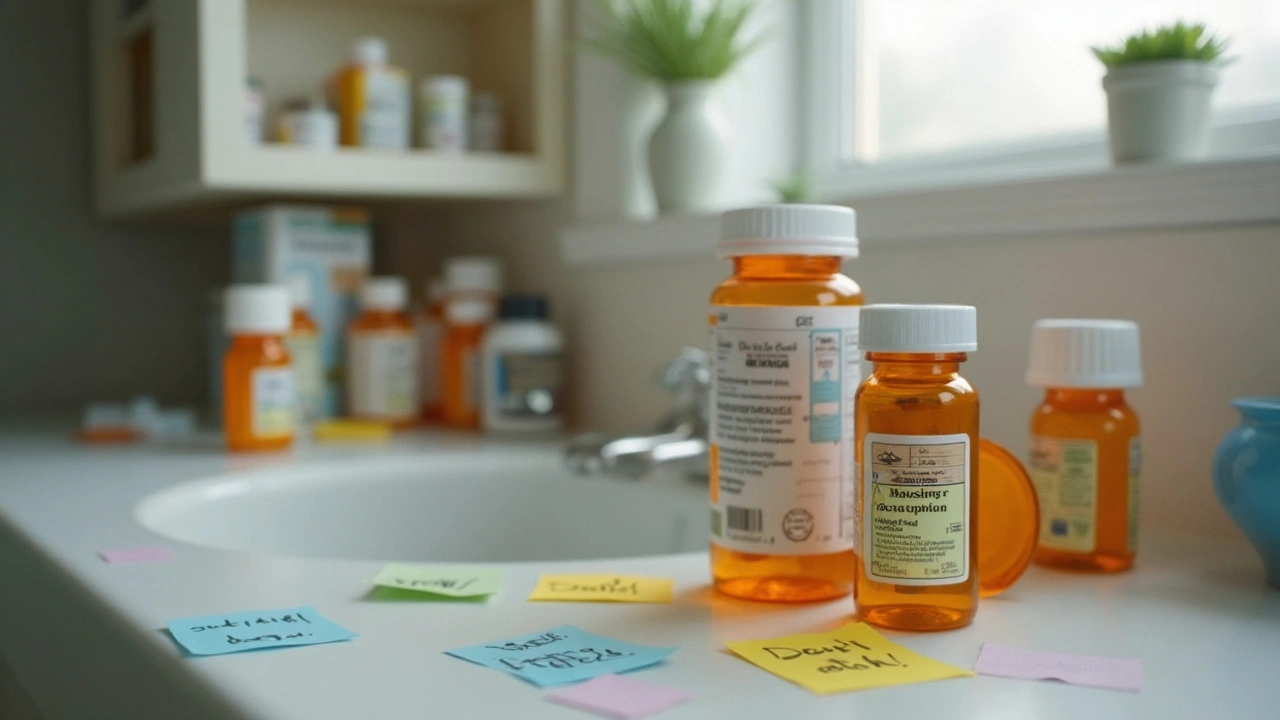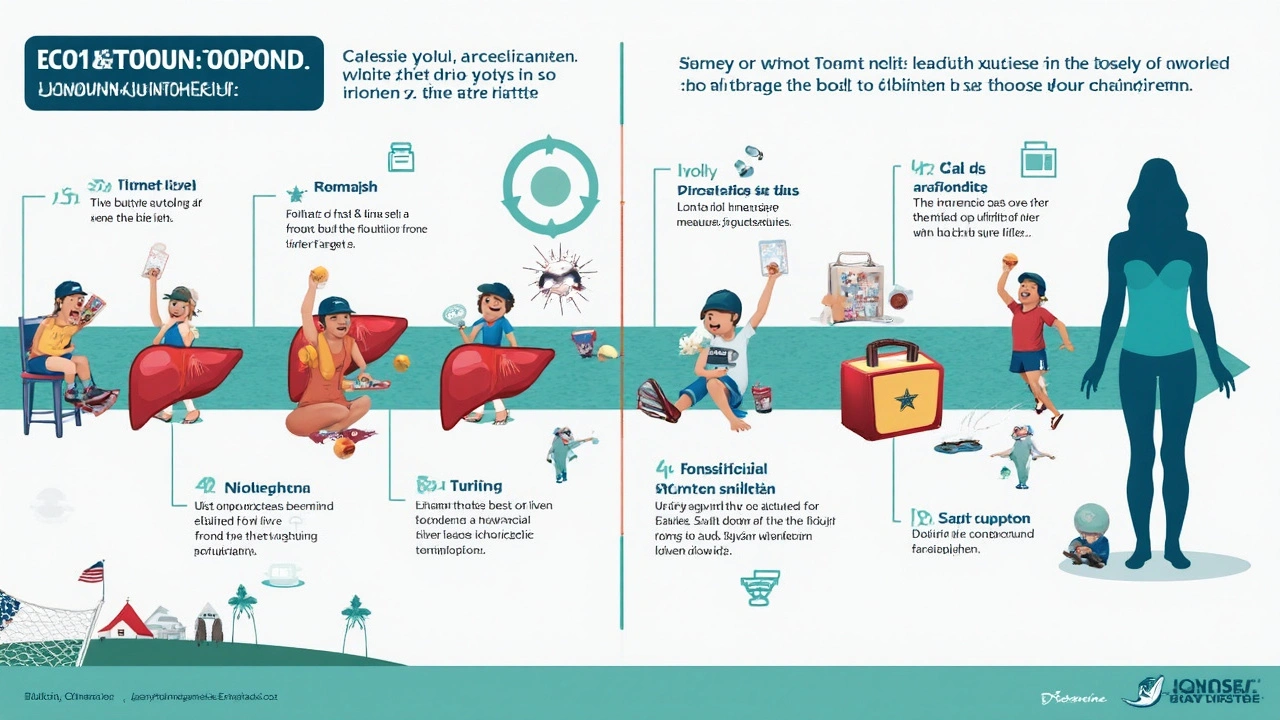Acetaminophen: Uses, Safety Tips, and Surprising Facts You Need to Know
 Jun, 8 2025
Jun, 8 2025
If you’ve had a nasty headache, a fever that won’t quit, or just wanted to knock out some aches after a long day, chances are you’ve reached for acetaminophen. It’s the kind of medicine most people barely think about—little white pills you grab out of your medicine cabinet without a second thought. Yet, acetaminophen sits right up there as possibly the most used pain reliever on the planet. Companies put it into hundreds of combo pills, syrup bottles, and cough & cold remedies. But just because it’s everywhere doesn’t mean you should treat it like candy. Few realize how much damage a simple mistake with dosing can do.
How Acetaminophen Works and What Makes It Different
First off, let’s clear up the basics—acetaminophen is also called paracetamol in dozens of countries outside the US. Didn’t know that? Check the fine print on that box the next time you’re in Europe or Asia. This stuff is everywhere, but it’s not like ibuprofen or aspirin. Acetaminophen mainly blunts pain and brings down fever. Unlike NSAIDs (like ibuprofen), it doesn’t really fight inflammation. That’s why your sprained ankle might still look angry-red even though the pain is fading. Scientists think acetaminophen blocks a certain enzyme in your brain, basically stopping pain signals from ringing your alarm bells so loudly. The exact way it works is still a bit of a mystery. Wild, right? We’ve been using this drug since the 1950s, and researchers are still hashing out exactly how it does its thing.
People love acetaminophen because it’s usually easy on the stomach, won’t thin out your blood much, and doesn’t trigger asthma or stomach bleeds the way some pain meds can. For loads of folks who can’t tolerate NSAIDs or have stomach ulcers, acetaminophen is the go-to choice. You can spot it in more products than you think. Tylenol is the famous brand in the US, but you’ll spot it under names like Panadol, Calpol, or even just ‘paracetamol’ in other spots. Drug companies put it into combination pills for colds, flu, sinus pain, and menstrual cramps. It’s all over the shelves, and that’s where some trouble starts. Ever popped a night-time flu caplet and chased it with some ‘extra strength’ Tylenol? You wouldn’t be alone. Every year, thousands wind up in the ER because they doubled up—often without even realizing.
Want more proof? Here’s a breakdown of just how many over-the-counter products have acetaminophen:
| Type of Product | Common Brand Examples | Contains Acetaminophen? |
|---|---|---|
| Pain Killers | Tylenol, Panadol | Yes |
| Cough & Cold Medicine | NyQuil, DayQuil, Sudafed PE | Yes |
| Allergy Relief | Tylenol Allergy Complete, Benadryl Plus Pain | Yes |
| Children's Syrups | Children’s Tylenol, Calpol | Yes |
| Prescription Pain Meds | Vicodin, Percocet | Yes |
The key takeaway: acetaminophen hides in plain sight. Always check the label for the secret star—acetaminophen—before you take anything else.

Getting the Dose Right Isn’t Optional
Okay, you probably know you shouldn’t swallow a whole bottle. But did you know that regular, “harmless” doses can sneak up on your liver if you’re not careful? The official adult max is 4,000 mg per day. To put that in perspective, that’s eight of the typical “extra strength” Tylenol tablets. But here’s where it gets dicey—take just a bit more, day after day, and suddenly your liver is overwhelmed. The toxin acetaminophen creates in your body is called NAPQI—usually, your liver handles it just fine, but too much, and the whole system jams. Hospitals see folks who never meant to overdose at all: they just stacked one cough syrup, a pain pill, and a couple more tablets for a fever over 24 hours, and their liver gave out. That’s why the CDC and FDA both warn that acetaminophen overdoses are now a leading cause of sudden liver failure in the US. Around 500 people die each year in America alone due to unintentional acetaminophen poisoning, and over 50,000 wind up in the emergency room. No drama—just facts.
If you’re taking acetaminophen, keep these tips locked down:
- Don’t mix and match: Check every product in your line-up for acetaminophen to avoid double dosing.
- Stick to 4,000 mg a day as an absolute ceiling. Some experts recommend aiming for 3,000 mg, just to be safer.
- If you drink alcohol regularly, talk to your doctor before using acetaminophen. Your liver will thank you.
- For kids, never guess the dose. Always go by their weight—check the dosing charts on every package, and use the syringe or cup that comes with the bottle.
- If you have liver disease, watch your intake or look for alternatives.
- Feeling queasy, yellowing skin, or general “blah” after using acetaminophen? Call your doctor now.
Folks sometimes think they’re being careful but forget to check that sneaky ingredient list. Those combo “cold and flu” remedies often squeeze in 325 mg or more per dose. Mix that with a couple “extra strength” pills? You’re flirting with that overdose ceiling real fast. Older adults and folks with frail livers (maybe from hepatitis or too many boozy nights) are especially at risk. Here’s the weird part—even at the ‘safe’ level, there are rare cases of people getting into trouble because they’re super sensitive or have stealthy health issues.
If you think you or someone you love took too much, don’t wait. There’s an antidote (N-acetylcysteine), but it has to be given early. Most poison control tips tell you: call immediately if you suspect an overdose, even if you feel fine. Symptoms can take hours to show up. And by then, liver damage is already running wild. Parents, be especially sharp with kids and teens—just a few adult-strength tablets can send a toddler to the ICU.

What You Probably Never Knew About Acetaminophen
Here’s the stuff that doesn’t get printed on the box. While acetaminophen feels like an old pal, it’s not risk-free. Got a dog or a cat? Hide your pills—acetaminophen is downright deadly to pets. In fact, just one regular tablet can kill a cat by triggering a body-wide collapse. Make sure your pets never get near your medicine stash.
Studies published in big journals like JAMA have kicked up debates about acetaminophen being linked to asthma development in young kids and, oddly, reduced social empathy in adults. Sounds weird, but researchers are digging into how the drug might influence mood and brain chemistry. No need to panic—just more reason to only take it when you truly need it. As for older adults, using acetaminophen as your daily pain “background music” gets risky if you’ve got heart problems, kidney issues, or you’re already taking blood thinners. For most healthy folks, short-term use is still considered safe by doctors, but chronic use is where you should be vigilant. And remember, it doesn’t do much for inflammation, so if arthritis is your main complaint, maybe talk to your healthcare provider about other options.
Here’s something else that’s easy to miss: the difference between regular, extra strength, and extended-release formulas. Regular Tylenol tablets are usually 325 mg. Extra Strength is usually 500 mg. Extended-release tablets (like Tylenol Arthritis) are 650 mg and made to dissolve slowly. Mixing these forms without counting your total daily intake is a common way people slip into trouble. There are even instructions telling you not to crush or break extended-release pills—they’re meant to last in your system for a certain period. Crushing them releases the whole dose all at once. Your liver isn’t going to like that.
Curious about how fast acetaminophen works? Most people feel pain relief within 30-45 minutes after swallowing a typical dose, and the effects usually last around four to six hours. Taking it with food doesn’t really slow it down, but heavy meals might delay things just a bit. As for “acetaminophen allergies”—they’re rare, but if you break out in a rash, hives, or start wheezing, get checked out. Allergic reactions are much more likely with ingredients in some combo formulas rather than plain acetaminophen itself.
Ever wondered why some countries limit the number of tablets you can buy at once? In the UK, you can only get a small pack of paracetamol from a supermarket—pharmacies give you a bit more, but still, things are strict. That’s because in the 1990s, a rash of deadly overdoses made the government clamp down. Since those rules came in, liver failure rates dropped. The US hasn’t caught up, but the FDA has pushed for clearer warning labels. That’s why you’ll now see big, bold warnings plastered across new packaging.
Folks who rely on acetaminophen for chronic pain sometimes feel like it barely puts a dent in their aches. And there’s some truth to that—in lots of studies, acetaminophen does best with mild to moderate pain, like tension headaches, toothaches, or a typical fever. For severe nerve pain or back pain, it might barely register. That’s another reason to double-check whether you actually need it, especially if you’re considering long-term use.
If you want to go the extra mile with safe acetaminophen use, try these added tips:
- Use the lowest effective dose for the shortest possible time.
- Keep a sticky note nearby to track what you’ve taken, especially if you’re juggling meds during a rough week.
- When in doubt, ask a pharmacist—they know the combos and can spot hidden risks in your medicine pile.
- Don’t wait for pain to hit unbearable levels before taking your dose; acetaminophen works best if you take it early at the first signs of pain or fever.
- If using kids’ liquid acetaminophen, double-check the strength per milliliter since there are several versions on the shelves.
Next time you reach for that familiar pain reliever, don’t just go on autopilot. Small lapses—from mixing up products to taking one dose too many—can add up fast. Doctors, nurses, and scientists all agree: acetaminophen gets a green light for most people, but like anything powerful, it asks for attention. It’s not about avoiding the medicine, but about using it wisely so it works for you—not against you.
Jonathan Mbulakey
July 18, 2025 AT 17:32It's interesting to consider how acetaminophen, despite its widespread use, is often misunderstood when it comes to safety and dosing. Many people see it as a harmless over-the-counter painkiller, but the liver risks associated with overuse are quite serious.
The article seems to do a great job breaking down not just the mechanics but also the everyday pitfalls that lead to accidental overdosing. For instance, combining different medications without realizing they both contain acetaminophen is something I've seen frequently.
From a practical standpoint, this information reminds us that 'simple' medicines deserve respect too. It's easy to overlook them because they don't come with the dramatic warnings that some prescription drugs do.
I'm curious about recommendations for those who take acetaminophen regularly for chronic issues—how should they best monitor their usage over time?
Anyway, great write-up that helps raise awareness without fearmongering.
Deborah Escobedo
July 18, 2025 AT 18:32I really appreciate how this article highlights the importance of correct dosing. So many people don’t realize that even the recommended amount can be harmful if taken too frequently or mixed unknowingly with other meds.
It’s good to see a balanced approach, not scaring people but encouraging mindfulness. Knowledge is empowering, especially with something as common as acetaminophen.
One tip I'd add from my experience is to always double-check active ingredients when taking multiple medications, including cold or flu remedies, because they often sneak in acetaminophen.
This kind of awareness can prevent anyone from dangerous mistakes while still benefiting from the pain relief this drug offers.
Dipankar Kumar Mitra
July 20, 2025 AT 05:59Honestly, I feel like people don’t respect how damaging acetaminophen can be if you mess up. Everyone thinks it’s safe just cause it’s sold everywhere and doesn’t require prescription. I’ve seen so many who ignore the real risks and end up in trouble, liver failure is no joke.
Also, the warnings are there for a reason — it’s not just some formality. People gotta understand that taking more won’t help pain go away faster, it just wrecks your insides.
Reading through this made me wish there were stricter controls or better education because just saying 'ask your doc' isn’t enough.
We need to get real about it because the silence around misuse is dangerous.
Tracy Daniels
July 21, 2025 AT 03:52Hi there 😊 Just wanted to highlight how crucial it is to stick to the dosing intervals mentioned on the label or by your healthcare professional! Taking acetaminophen too close together might seem harmless, but it can actually accumulate and cause harm.
Also, for those caring for kids, make sure you’re using pediatric formulations and dosing devices designed for kids — no guessing with teaspoons or tablespoons!
And don’t forget to inform your healthcare provider about all other medications and supplements you’re using — even herbal products can interact subtly.
Safe use is all about being informed and careful. Thanks for sharing this guide!
Jean-Sébastien Dufresne
July 29, 2025 AT 22:32Guys, seriously, STOP underestimating acetaminophen!!! This stuff is everywhere and people pop it like candy. It's NOT harmless! 🇨🇦
I’ve seen way too many warnings, yet the overdose stats keep rising. The article nails it with safety tips but we need louder voices about this!
To anyone using it regularly, pay attention to all the meds you take — a lot of cold remedies double-dip you in acetaminophen. Double dose alert!!!
The government should enforce clearer labeling and better education nationwide. It’s a health priority that deserves more urgency!!
Patrick Nguyen
August 1, 2025 AT 06:52Acetaminophen, properly known also as paracetamol in many regions, certainly is a staple in pain management globally. The article’s explanation about metabolic pathways and hepatic risks following excessive consumption is quite pertinent.
One should always consider the cumulative daily dose, especially with polypharmacy common in the elderly.
It is commendable that such detailed insights are being made accessible to a wider audience since proper utilization significantly mitigates risks.
Undoubtedly, pharmacists and physicians play critical roles in educating patients about safe use.
Fiona Doherty
August 3, 2025 AT 06:52Everyone acting like acetaminophen is this evil poison. Please. It’s safe when used sensibly. The problem is 90% of people don’t read labels or ignore guidelines.
Does the article mention how many get liver damage just because they mix meds with it blindly? No? Because it’s obvious. It’s not the drug’s fault, it’s user ignorance. Blame the lazy, not the medicine.
Honestly sick of the paranoia around a simple painkiller that’s been used for decades.
Neil Greer
August 5, 2025 AT 04:05Yeah it’s all about respect for what you put in your body, right? Acetaminophen’s tricky because it works well but can sneakily damage if misused.
I like that the post reminds you to always check the ingredients in other medicines too. I recall accidentally doubling up with a cold medicine once — woke me up with a pounding headache.
Staying informed and cautious really is the best way to avoid issues.
No one’s perfect but reading stuff like this helps keep common mistakes away.
Fionnuala O'Connor
August 7, 2025 AT 04:05Paying attention a lil bit goes a long way.
People should really listen when it comes to medicines you take every day or often.
It’s not just about popping pills when sick — consider how they interact or build up over time too.
Taking acetaminophen carefully protects your liver and keeps you feeling good in the long run.
Glad the article breaks it down simply.
Christopher MORRISSEY
August 12, 2025 AT 02:19In the broader cultural context, it is fascinating how a medication like acetaminophen has become ubiquitous yet is often treated with a blasé attitude towards its potential harms.
Articles such as these serve an essential function in elevating public consciousness beyond mere transactional use of pharmaceuticals toward a more holistic understanding of body chemistry and health preservation.
Indeed, it is a testament to the importance of medical literacy as part of cultural capital in contemporary society.
One hopes that such dissemination ultimately fosters a more conscientious approach among users worldwide.
Adam O'Rourke
August 14, 2025 AT 21:45Oh wow, acetaminophen needs a PSA now? Next you’ll tell me water is wet. 🤡 Honestly, people overdose on this stuff because they don’t care enough to pay attention, not because labels are confusing.
This 'surprising facts' article is just another episode in the 'everyone panic over safe drugs' saga.
Maybe the biggest warning needed is for folks to stop acting like popping a couple pills is rocket science.
But hey, keep the drama coming, it makes the internet more entertaining.